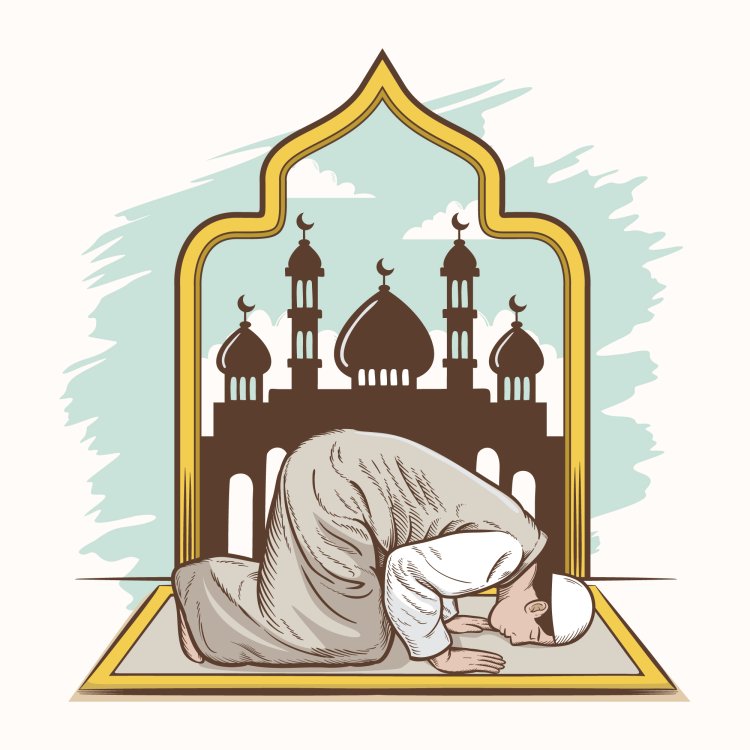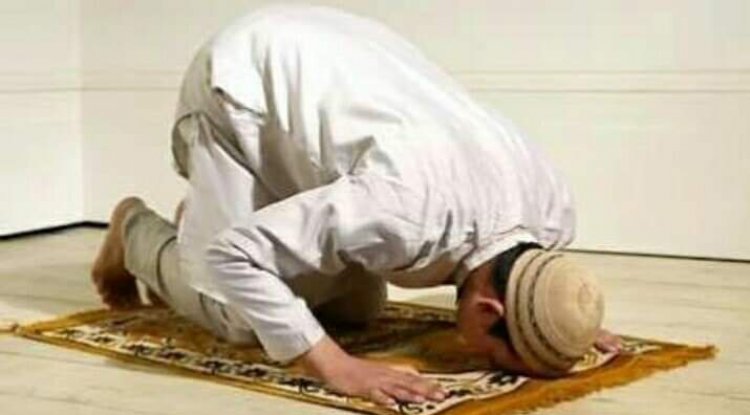the two rakaat of the friday prayer - conditions and the its sunnah and its makrooh acts
, makrooh acts of the two rakaat of the friday prayertwo rakaat of the friday prayer, conditions of two rakaat of the friday prayer, sunnah of the two rakaat of the friday prayer

TWO RAK'A
Al-Nasai'e ( 3/111) narrated from Umar r.a. hase been said "Friday prayer have two rak'a instead what have prophet said."
Abu Daud have narrated "Friday prayer is obligatory upon every mu'min in congregation.
Base on prove up there, the scholars are unanimously, about such thing ( number rak'a is two and obligatory on congregation).
To get congregation in Friday prayer, there should get one rak'a fully, If there get it, the Friday prayer is valid and if not, there should be take thuhr prayer. Hence, the number of makmum at less must forty men to get obligatory conditional jumua'h. Friday prayer is invalid if not enough participant.
Therefore, one is not consider to have performed it and does not attain the merit of the congregational prayer unless he performs a complex rak'a behind the imam, because praying in congregational is a necessary condition for the validity of Friday prayer
If someone came after imam stand up from rukuk two rak'a, the Friday prayer invalid and obligatory to someone complete prayer before imam give 'salam' with thuhr prayer ( four rak'a).
- VALIDITY CONDITIONS OF THE FRIDAY PRAYER
- Prayer and khutba take place during the time of Thuhr prayer. Anas narrated: “The Prophet used to perform the Friday prayer when the sun passed its zenith.[1] (Narration by Al-Bukhari). Also, Salama ibn Al-Akwa’ narrated. “We used to gather (to perform Friday prayer) with the Messenger of Allah after the sun’s zenith, then return seeking the paths of shade.[2] (Narration by Muslim)
Before the time of Thuhr begins, the khutba which is started is not valid that is because the Friday prayer is reduced to two rak’as by the khutba, therefore if the prayer is not valid before its time, then the khutba is not either.
If the imam believes he cannot establish Friday prayer with giving two khutbas and praying two rak’as then Friday prayer is not obligated and will replace with Thuhr prayer.
If the coggretaion has doubts before starting the Friday prayer that times is over, then, they must not begin it, because one its conditions (the time) is not fulfilled, therefore it is not valid to start the prayer while having doubts about one of its conditions and will replace with Thuhr prayer.
Most importantly, if the Friday prayer is missed, it is not valid to make Friday prayer after the time for Thuhr is over or at another Friday. So, who miss it, he must make it as Thuhr prayer.
2, The location of the Friday prayer must be located in strategies location likes inside a village or a town even if built with wood or straw, and even if not in the mosque such as in an open place inside the town because the Prophet said: Pray as you have seen me pray”and he prayed in the mosque. Therefore, praying at the outside of Friday prayer site in town is definitely not valid.
More ever, if a town or village is collapsed or destroyed. They must rebuild it until completed, the Friday prayer is valid. Unfortunately, until completed, the Friday prayer cannot establish and not valid. Otherwise, the Friday is not valid in the tent or home if they are able to hear the call of the prayer. For example, the Arabs of the used to live in Medina and the Prophet did not obligated them to attend the Friday prayer since the call to prayer did not reach them.
3, How much locations of Friday prayer in same times. It is valid to establish the Friday prayer at multiple places when there is hardship for them all to pray at one location likes when a town where Friday prayer takes place is growing and has no mosque or other to accommodate everyone without hardship.
When there are many Friday prayer, then only the one with the first takbir is valid while others are not after it, and their participants must also perform Thuhr within time. If the Friday prayers are simultaneous at all locations, then they are all invalid. Thuhr will should be performed in congregation after an invalid Friday prayer.
The valid and invalid Friday prayers got all mixed up when Friday prayers are held, and it is not clear which was the first, or it was forgotten after being identified, then everyone is obligated to start over together as one Friday prayer but if not enough times, it will replace with perform Thuhr prayer.
4, Congregational must needed to legal the Friday prayer. Its mean, alone prayer is totally not valid. Its mean who forty person included a imam who permanent residence must counted, sane, male, and reach age of puberty must at site of Friday prayer when opening takbir is begins.
However, the number forty male must still from starting the khutba until the end of the prayer. So, if a few leaving during khutba, they are not counted until they return in a short period time, the khutba is not need to start over but in cases they return in a long period time, the khutba must start over. The long period time means two rak’as prayer time.[3] The Friday prayer will invalid if they return in long period time because the number of participants is less then forty.
- The Friday prayer should be followed by two kutbas, and the imam should sit in between them. Jaber narrated : “The Messenger of Allah used to give the khutba while standing up then sit, and then get up to give (the second) khutba standing up.”[4]
- SUNNA THINGS TO DO FRIDAY DAY
1.To recite Al-Kahf (Quran, 18). Abu Sa'id Al-Khadari narrated that the Propher said "One who trcites Al-khaf on Friday, light will be illuminated for him till the following Friday."[5]
- Also to clean one's teeth with siwak
- To cut one's nails, remove the axillary hair, trim the moustache, and shave the private parts. The evidence for is general recommendation.
4.To increase one 's du'a, because on Friday there is an hour (opportune moment ) of answered prayers. Abu Hurayrah narrated that the Messenger of Allah mention "there is an hour ( on Friday ) when a servant praying shall not ask allah for anything but it will be granted . The prophet indicated how short a time span with a gestured of his hands.”[6]
- To put on the best parfume one has.[7]
- Clean one's clothes. The best colure to wear is white. Samura ibn janbad narrated that the prophet said: "Wear white clothes for they are the best of all your clothes and use them for shrouds for your dead." [8]
- MAKROOH ACTS FOR ONE ATTENDING THE FRIDAY PRAYER
First of all, to cut through the crowd to find a place. Abdullah ibn Busr said: “I was sit next to him during the Friday prayer when a man came in stepping over (cutting through their rows). The Messenger of Allah said to him: “Hey, down for you have offended the people”.[9] It is not makrooh for imam because he must reach the mimbar through the lines.
Moreover, claps one’s fingers during the khutba. Abu Hurayrah narrated the Prophet said: “When one of you is going prayer, he is in prayer.”[10] (Narration by Muslim)
Finally, to draw back one’s knees to one’s chest with one’s hand or clothes during khutba. Sahl ibn Mu’ath narrated from his father that: “The prophet forbidden drawing back one kness to one’s chest during Friday prayer while the imam delivering his khutba” (Narration by Al-Tirmithi)[11]
[1] Al-bukhari, Vol. 1, The Book of Friday Prayer, Chapter 14/862.
[2] Muslim, Vol 2, The Book of Friday Prayer, Chapter 9/31.
[3] The criteria for that is a period long enough to briefly perform two rak’as.
[4] Muslim, Vol 2, The Book of Friday Prayer, Chapter 10/35.
[5] Al-Bayhaqi, Vol 3, page 249
[6] Al-Bukhari, Vol 1, The Book of Friday Prayer, Chapter 35/893
[7] Al-Nawawi said: You should know what has been mentioned (wearing perfume) is exclusive to attending the Friday prayer and not recommended for anyone attending a meeting or gathering of people. Al-Majmu’, Vol.4, page 413.
[8] Al-Bukhari, Vol 1, The Book of Friday Prayer, Chapter 4/841.
[9] Al nasa’i, Vol 3, page 103.
[10] Muslim, Vol 1, The Book of Mosques, Chapter 28/152.
[11] Al-Tirmithi, Vol 2, The Books of Prayer, Chapter 370/514.
[12] Ahmad, Vol 1, pages 402 and Muslim, Vol 1, pages 452.
What's Your Reaction?

















